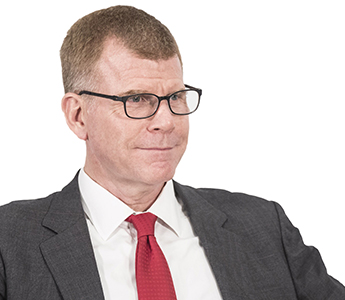Q: What was the rationale behind the establishment of Saudi Arabia's National Development Fund [NDF]?
A: The NDF was set up as an umbrella organisation, initially sitting on top of six sectoral development funds in the country. Each of these individual sectoral funds was off busily working in its sector doing the work that it had been doing for, in some cases, as long as 50 years.
There were concerns on the overlap between some of the mandates of these funds, whether the funds were properly aligned behind Vision 2030, the government’s medium- to long-term development plan, and about how efficiently and effectively these funds were operating.
At the beginning of 2020, we proposed a new strategy for the organisation to transition into becoming a development finance institution [DFI], making the NDF a much more deeply integrated organisation with much more oversight over the individual funds, looking for opportunities for deeper integration across the funds through shared services and common platforms, but also importantly looking for opportunities to best leverage the resources that the funds have at their disposal.
The distribution of [the funds’] capital has not necessarily been optimal or as able to respond as quickly to the individual emerging challenges as they might otherwise have been if they’d been operating using a DFI model. We aim to have this model up and running over the course of the next two years.
Q: What have been the main practical achievements of the NDF so far?
A: The main things we’ve achieved thus far have been the development of common understandings and definitions across the funds we sit on top of, in terms of financial management, governance principles and how to measure and assess impact.
The first two of those are pretty straightforward measures, such as the adoption of IFRS accounting standards, together with basic good governance standards.
On the impact front, one of the main factors behind the initial establishment of the NDF was concern about what level of impact the individual funds were actually having in their day-to-day activities. Funds had been historically measured and assessed on their ability to disperse funds, rather than thinking about the impact of those disbursements and how effective they had been.
So over the first year of our operations, we’ve developed some initial measurements for the funds that help them understand a little more about how they think about impact, which also helps us ensure that we’re aligned more closely behind Vision 2030 objectives.
Q: One of the crucial functions for DFIs, such as the Korea Development Bank and Germany’s KfW, is to issue bonds. Will the NDF be in a position to issue bonds and sukuk in the near future?
A: We’re trying to set things up in such a way that this could be done at some point in the future. We have spoken to our board about this and there are no objections in principle. However, it is very important to work in close coordination with the Ministry of Finance and the debt management office, given the structure of the economy in Saudi Arabia.
So we are setting things up in such a way that this could be done at some point in the future, should the NDF reach a level of maturity where that would make sense. It is certainly something that we have in the back of our mind but it is something that we do not have specific approval for at this stage.
Q: How has the current economic situation in Saudi Arabia affected the NDF and its mission?
A: We’re mobilising all the resources in the funds to help support the firms, enterprises, sectors and geographies that have been most negatively impacted by the twin shocks of Covid-19 and [lower] oil price levels. We’re working very hard at developing programmes for the rescheduling of individual loans, the provision of additional working capital, and to provide support for people who have been laid off as a result of these twin shocks.
In the longer run, [the crisis] emphasises the importance of the country having a DFI in its economic toolbox. Like many resource-dependent economies, Saudi Arabia has done a lot in terms of trying to make spending more countercyclical. But in reality, a still non-trivial portion of spending in the country has been pro-cyclical in nature.
Having a DFI will enable the country to have something in its economic toolbox that can be more countercyclical. Of course, that depends in part on the ability to ultimately issue bonds and having other sources of revenue. But the crisis underscores the need of having an institution such as this.













